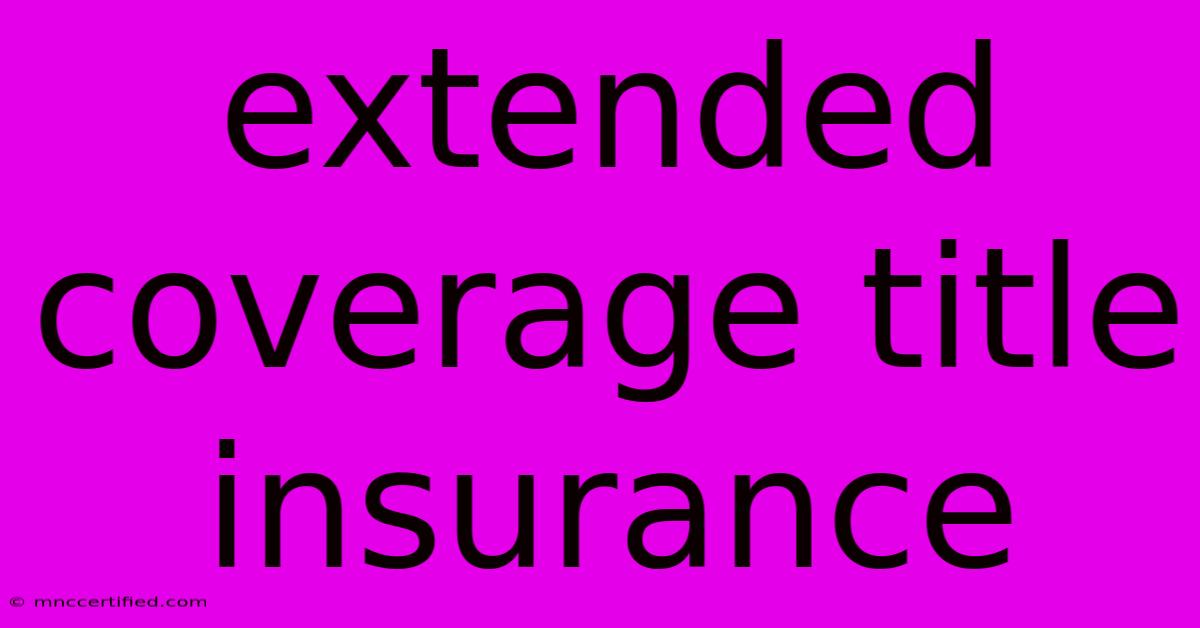Extended Coverage Title Insurance

Table of Contents
Extended Coverage Title Insurance: Protecting Your Investment Beyond the Basics
Buying a home is likely the biggest financial investment you'll ever make. Title insurance protects you from unexpected title defects that could jeopardize your ownership. While standard title insurance covers many common issues, extended coverage title insurance provides an extra layer of protection against a broader range of potential problems. This comprehensive guide explains what extended coverage title insurance is, why you might need it, and how it differs from standard coverage.
What is Extended Coverage Title Insurance?
Standard title insurance, typically required by lenders, protects against issues like forged deeds, undisclosed heirs, and errors in the public record. However, it often excludes certain risks. This is where extended coverage comes in. Extended coverage title insurance expands the protection to include a wider array of potential title defects, offering significantly more peace of mind for homeowners. These additional protections often cover issues that might not be discovered during a standard title search.
Key Differences Between Standard and Extended Coverage:
| Feature | Standard Coverage | Extended Coverage |
|---|---|---|
| Coverage | Basic title defects | Broader range of title defects, including unrecorded liens |
| Cost | Less expensive | More expensive |
| Who benefits? | Primarily lenders | Primarily homeowners; offers greater protection |
| Risks covered | Forged documents, undisclosed heirs, etc. | Unrecorded liens, survey issues, encroachments, etc. |
Why Choose Extended Coverage Title Insurance?
While standard coverage is essential, extended coverage provides crucial additional safeguards. Here's why you should consider it:
- Protection against unrecorded liens: A previous owner might have incurred a debt that wasn't properly recorded, potentially leading to claims against your property. Extended coverage protects you from such unforeseen liabilities.
- Addressing survey and boundary issues: Disputes over property lines and encroachments can be costly and time-consuming to resolve. Extended coverage often includes protection against these types of disputes.
- Covering potential easements and rights-of-way: Unexpected easements or rights-of-way impacting your property usage are covered under extended coverage policies.
- Peace of mind: Knowing you're protected against a wider array of potential problems gives you greater confidence in your investment.
Who Needs Extended Coverage?
While not always mandatory, extended coverage title insurance is highly recommended for:
- Homeowners purchasing older properties: Older properties are more likely to have complex title histories and potential hidden issues.
- Buyers in areas with frequent construction or development: New developments can lead to boundary disputes and other title concerns.
- Investors purchasing multiple properties: The risk increases exponentially when investing in multiple properties. Extended coverage mitigates this elevated risk.
Understanding the Costs and Benefits
The cost of extended coverage is higher than standard coverage. However, the potential savings from avoiding costly legal battles and title disputes far outweigh the increased premium in many cases. Think of it as an insurance policy against unforeseen problems that could cost you thousands, or even hundreds of thousands, of dollars to resolve.
Consult with a title insurance professional: Discuss your specific circumstances and property details to determine if extended coverage is the right choice for you. They can help you assess your risk and choose the policy that best suits your needs.
Conclusion: Protecting Your Investment
Extended coverage title insurance provides valuable peace of mind and financial protection against a wide array of title defects not covered by standard policies. While the premium is higher, the potential long-term benefits often make it a worthwhile investment for homeowners, especially when purchasing older homes or in complex real estate markets. By understanding the differences between standard and extended coverage, you can make an informed decision that best protects your significant investment. Remember to consult a qualified title insurance professional to determine the best coverage for your specific situation.

Thank you for visiting our website wich cover about Extended Coverage Title Insurance. We hope the information provided has been useful to you. Feel free to contact us if you have any questions or need further assistance. See you next time and dont miss to bookmark.
Featured Posts
-
Broncos Defeat Yotes 4 0 Record
Nov 19, 2024
-
Uefa Nations League Croatia Vs Portugal
Nov 19, 2024
-
Poland Vs Scotland Live Nations League Result
Nov 19, 2024
-
Super Micro Stock Jump New Data Center Strategy
Nov 19, 2024
-
Insurance Agency Value Calculator
Nov 19, 2024